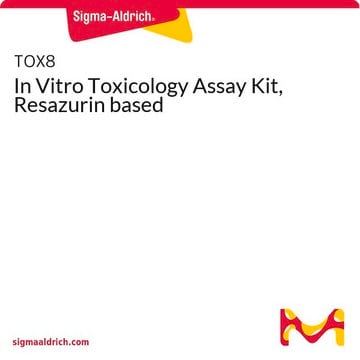CBA415
Live Dead Cell Viability Assay Kit for 3D and 2D cell culture
Live-dead cell viability kit for 3D and 2D cell cultures. Indicates live, dead and total cell count. Sufficient for 5 x 24-well plates or 12 x 96-well plates.
Synonym(s):
Viability Assay Kit
About This Item
Recommended Products
detection method
fluorometric
General description
One kit contains reagents sufficient for 5 x 24-well plates or 12 x 96-well plates.
<bold>Advantages:</bold>
1. Tested and optimized for 3D cell culture, Spheroid culture, organoid culture, 2D cell culture and flow cytometry.
2. Easy to use and quick protocol.
3. Stronger intensity of Calcein AM and Hoechst dyes compared to other products.
Spectral Properties
Calcein AM: Ex/Em: 490/515 nm (Green)
Propidium Iodide: Ex/Em: 535/617 nm (Red)
Hoechst 33342: Ex/Em: 361/486 nm (Blue)
Protocols:
Protocols for staining 2D monolayer cell culture, 3D cell culture, 3D spheroids and 3D organoids are included in the datasheet.
Storage and Stability
Disclaimer
Storage Class Code
10 - Combustible liquids
Certificates of Analysis (COA)
Search for Certificates of Analysis (COA) by entering the products Lot/Batch Number. Lot and Batch Numbers can be found on a product’s label following the words ‘Lot’ or ‘Batch’.
Already Own This Product?
Find documentation for the products that you have recently purchased in the Document Library.
Articles
Organoid culture FAQs. Learn how to culture and analyze organoids following established 3D cell culture protocols. Tips and tricks.
Organoid culture FAQs. Learn how to culture and analyze organoids following established 3D cell culture protocols. Tips and tricks.
Organoid culture FAQs. Learn how to culture and analyze organoids following established 3D cell culture protocols. Tips and tricks.
Organoid culture FAQs. Learn how to culture and analyze organoids following established 3D cell culture protocols. Tips and tricks.
Related Content
Monitor barrier formation using colon PDOs, iPSC-derived colon organoids, Millicell® cell culture inserts, and the Millicell® ERS. 3.0.
Monitor barrier formation using colon PDOs, iPSC-derived colon organoids, Millicell® cell culture inserts, and the Millicell® ERS. 3.0.
Monitor barrier formation using colon PDOs, iPSC-derived colon organoids, Millicell® cell culture inserts, and the Millicell® ERS. 3.0.
Monitor barrier formation using colon PDOs, iPSC-derived colon organoids, Millicell® cell culture inserts, and the Millicell® ERS. 3.0.
Our team of scientists has experience in all areas of research including Life Science, Material Science, Chemical Synthesis, Chromatography, Analytical and many others.
Contact Technical Service






